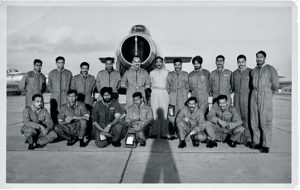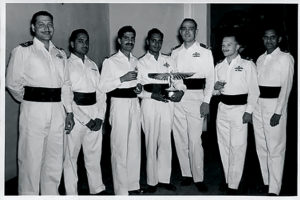Kamla Lowe’s husband died in a flying accident in 1962. At 98, she’s still waging a legal battle for pension the Air Force owes her
KAMLA LOWE is 98. But don’t be fooled by her age. She’s sprightly as ever, and tuned into what’s happening around her. Kamla follows the news and is therefore aware of the ongoing protest against the Citizenship Amendment Act and the proposed National Register for Citizens by the Dadis of Shaheen Bagh. She sees her reflection in them: they are fighting for what they believe is right, as she has been.
Kamla’s husband, Indian Air Force squadron leader JM Lowe, was killed in a flying accident on June 19, 1962, leaving her with their son Sanjeev, then four. Lowe, 37, was a test pilot on deputation with the Hindustan Aeronautics Limited. He was flying a Gnat when he suffered “violent pitch oscillations” and crashed.
Fifty-eight years later, Kamla is still fighting for her entitlement.
Sitting in the living room of her son’s home in Gurgaon, Kamla is waiting for some sunshine. It has been unseasonably cold, and at her age she feels the chill in her bones. Speaking to Newslaundry, the Lowe family recalled their struggle after the crash and the fight to receive pension.
“The Supreme Court and the Armed Forces Tribunal are hiding behind the technicality that she went to them late. They have turned a deaf ear to her pleading that she was never informed of her entitlement by any authority, and in fact repeatedly misled, in writing, by the IAF that she was not entitled to Special Family Pension,” Sanjeev said, referring to his mother.
Sanjeev added that then Air Commodore VR Damle, late Air Marshal PK ‘Babi’ Dey’s father-in-law, had tried to help them secure the pension “in his personal capacity”. “The letter he wrote in August 1962 is the first instance of anyone interceding for her to get pension,” Sanjeev said. “But Air Commodore Damle died early. My mother remembers seeing a lock on his door, and being told of his demise.”
“Air Chief Marshal Pratap Chandra Lal also tried to intercede on our behalf,” Sanjeev added. “But nothing came of that either.”
THE STRUGGLE
For the first nine years after the crash, the Lowe family did not receive any pension. The IAF informed Kamla that she wasn’t entitled to one, since her husband had opted for life insurance at HAL. “My father’s entitlement as a serving Air Force officer deputed to HAL was for a special family pension as per the Air Force Pension Rules of 1961, which predated his fatal crash,” Sanjeev said.

At the time, the Lowe family received an insurance settlement of Rs 1.25 lakh. “So, other than Rs 4,810 paid as annual premium for an IAF test pilot on HAL deputation, there was no additional cost on the IAF and the HAL for nine long years. We received our first pension – a nominal amount in 1971 – under the Ordinary Family Pension category, which was the wrong category applied to us. My mother got Rs 90 a month, and a child education allowance of Rs 20 per month was given until I was 18 years.”
In 1972, Sanjeev noted, new rules came about recognising that the families of military personnel who died in service were deprived of income they would otherwise have earned for the rest of their lives. “As a result, a higher rate of pension was given to soldiers, including test pilots deputed to HAL, as a Liberalized Family Pension.” The pension was 100 percent of their basic salary, and applied retrospectively.
“This pension is what we are fighting for,” Sanjeev said. “The Armed Forces Tribunal and the Supreme Court, though sympathetic to our cause, did not really give us any relief.”
PARTIAL VICTORY
Kamla wrote several letters to the Air Force over the years and, when nothing came of them, knocked the door of the Armed Forces Tribunal and, eventually, the Supreme Court. In 2017, the military court finally ruled in her favour, recognising her husband’s sacrifice and directing the Air Force to give her pension. It was only partial relief, though: it was the wrong category of pension, and the arrears ran back just three years.
“The total insurance amount paid to her, at the time of death of her husband, was Rs 1.25 lakh by any stretch of imagination; it could not have been anybody’s case that this young widow and child were to survive for the rest of their lives based on this one grant of insurance,” the tribunal added in its verdict, noting that Rs 8,691.65 had been deducted from the insurance settlement amount as estate tax.
“The terms and conditions of that insurance are not before us. However, it would be pertinent to mention that no insurance scheme can take away the right of pension of a serviceman, and therefore, consequently the widow.”
The tribunal reminded the government of a Supreme Court ruling that pension was a right, not a bounty. “Employees cannot be asked to sign undertakings contrary to law,” it reiterated, granting Kamla benefits under the Special Family Pension.
On January 29 last year, the Supreme Court upheld the military tribunal’s judgement and even imposed costs on the government.
Kamla’s fight though is not yet over.
FIGHT CONTINUES
Kamla said she felt cheated by the Air Force and disgusted by the behaviour meted out to her family. “After Mr Lowe’s plane crashed, no one from the Air Force came forward and offered any support,” she said. “I felt completely alone and lost.”
Sanjeev, who took the lead in his mother’s struggle for justice in 2017, added, “The cases cited by the Air Force as a precedent don’t apply to her as she is a dependent and did not sign service rules; she was dependent on the IAF to guide her. The Supreme Court in not ascribing delay to the IAF in her approaching the courts late is miscarrying basic tenets of natural justice. Her curative petition is against the Armed Forces Tribunal not recognising her right to Liberalized Family Pension, and her prayer for relief to the full extent of her entitlement from the date of death of my father.”

The curative plea details the “shabby treatment” meted out to an “ace pilot”. It further states, “There’s complete non-application of mind in respect of payment of Liberalised Family Pension. This pension is paid for officers who die in the line of duty where death is directly attributed to military service under Category E for Test Pilots for test flying accidents. The second mistake made by the tribunal was to restrict the payment of pension to three years from the date of the application made to the tribunal.”
Kamla reminisces about the challenges she faced in the initial days of her marriage with Lowe. “It was difficult initially. I was a doctor attached to the state of Uttar Pradesh, and Mr. Lowe was based at the Flying Instructors School in Tambaram, Chennai, and later in Jamnagar and Ambala.”
Commenting on how their relationship was “long-distance” then, Kamla said, “We wrote to each other all the time. I knew there would be dangers in flying. He would always brush off the dangers and be casual about it. He hid several incidents to protect me.”
Showing pictures and medals won by Lowe, Kamla proudly rattled off her husband’s achievements. “He was among the rare few in the IAF’s history to be an A1 Qualified Flying Instructor, Nabha Trophy winner as well as a winner of the Majithia Trophy.”
There isn’t much that Kamla remembers about that fateful day in June when Lowe’s plane crashed. “I just remember feeling uneasy that day. In fact, I was so uncomfortable, I recall I even called him at his base,” she said. By now, Kamla had resigned from her post with the Uttar Pradesh government and settled down with her husband at the Bengaluru base where Lowe was test flying fighter planes on deputation with HAL.
“He used to come home at 1:30 sharp for lunch. That day, when the doorbell rang, it wasn’t him at the door. I knew then,” Kamla said, sipping her hot cup of tea. “I don’t remember much after that.”
On September 11, 2019, in a last-ditch effort, Kamla wrote to Air Chief Marshal BS Dhanoa. The first line of the letter read: “My appeal to the Air Force to help restore my husband’s entitlement will be the last of my efforts given my old age.”
In her final communication with the authorities, she submitted, “That a wrong has been done is acknowledged by the courts. What they have not done is to correct the category of pension and the extent to which my husband’s lost life income has been usurped. The courts did not accede to our request that terms of military service under which my husband died entitled his family to Liberalized Family Pension, at enhanced rates, nor to our request to make good the deficiency from the date of his accident. This is where I am asking for your support.”
She added, “The limitation that binds courts for a class of service personnel does not bind the administration, and more pointedly the Indian Air Force, in undoing this long-done wrong with constant denials of appeals – to dependents of one of their own. If wrong has been done, then please at least support our appeal with the government. If your office strongly endorses his entitlement, it may finally put an end to the string of unjust administrative decisions that have taken a service officer’s earned income away from his family. The only beneficiary of my husband’s forfeited income is the government.”
Asked about the letter to the Air Force chief, Sanjeev said, “We sent the letter to ACM Dhanoa shortly before he retired. Dhanoa responded by sending two IAF officers who were privately quite apologetic but helpless about the IAF’s treatment of my mother. The two officers acknowledged my father was ahead of his time, and they have been briefed about his contributions, but they also told us that this would not happen now.”
The curative plea was filed in June 2019, shortly after the Supreme Court dismissed the review plea. Seven months later, the matter is yet to see the light of day. Kamla has been locking horns with the Air Force for over five decades now, and she just hopes time doesn’t run out for her before she sees justice.
www.newslaundry.com





